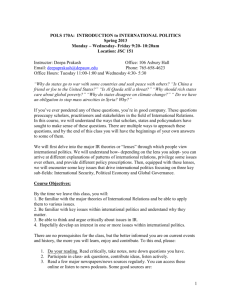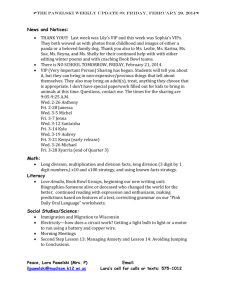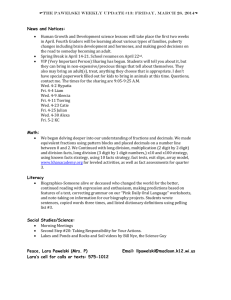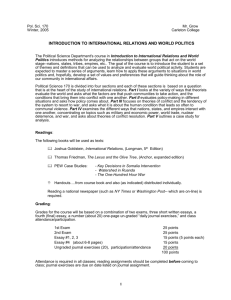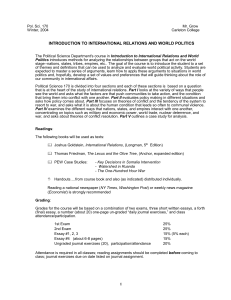Political Science 15-POL-160-001
advertisement
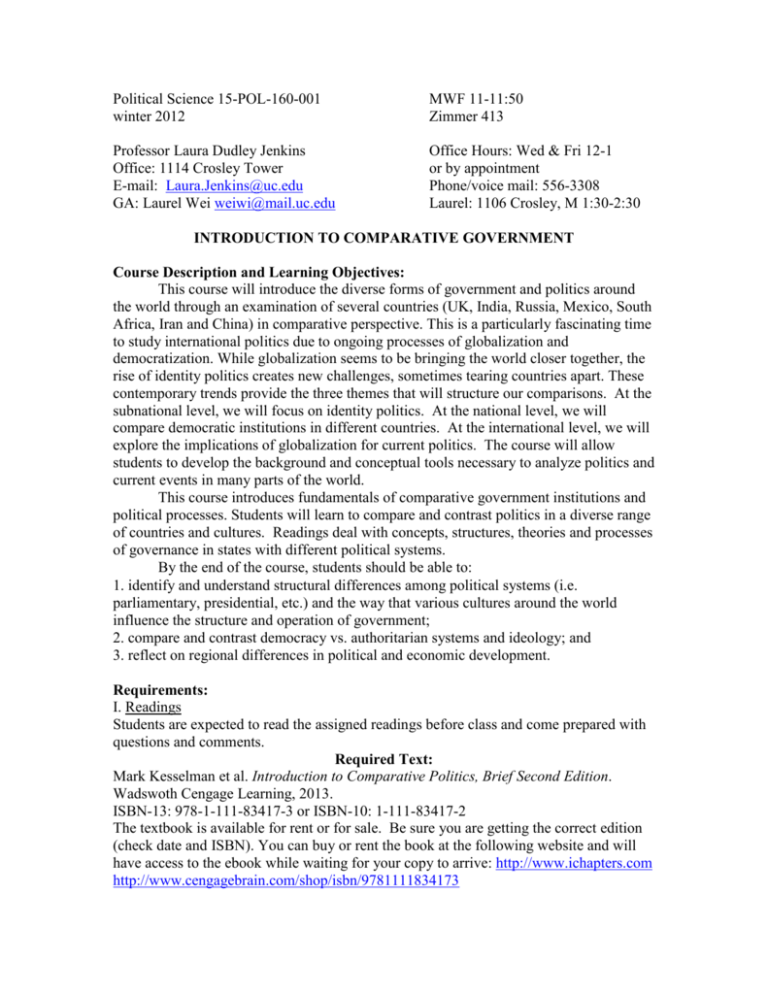
Political Science 15-POL-160-001 winter 2012 MWF 11-11:50 Zimmer 413 Professor Laura Dudley Jenkins Office: 1114 Crosley Tower E-mail: Laura.Jenkins@uc.edu GA: Laurel Wei weiwi@mail.uc.edu Office Hours: Wed & Fri 12-1 or by appointment Phone/voice mail: 556-3308 Laurel: 1106 Crosley, M 1:30-2:30 INTRODUCTION TO COMPARATIVE GOVERNMENT Course Description and Learning Objectives: This course will introduce the diverse forms of government and politics around the world through an examination of several countries (UK, India, Russia, Mexico, South Africa, Iran and China) in comparative perspective. This is a particularly fascinating time to study international politics due to ongoing processes of globalization and democratization. While globalization seems to be bringing the world closer together, the rise of identity politics creates new challenges, sometimes tearing countries apart. These contemporary trends provide the three themes that will structure our comparisons. At the subnational level, we will focus on identity politics. At the national level, we will compare democratic institutions in different countries. At the international level, we will explore the implications of globalization for current politics. The course will allow students to develop the background and conceptual tools necessary to analyze politics and current events in many parts of the world. This course introduces fundamentals of comparative government institutions and political processes. Students will learn to compare and contrast politics in a diverse range of countries and cultures. Readings deal with concepts, structures, theories and processes of governance in states with different political systems. By the end of the course, students should be able to: 1. identify and understand structural differences among political systems (i.e. parliamentary, presidential, etc.) and the way that various cultures around the world influence the structure and operation of government; 2. compare and contrast democracy vs. authoritarian systems and ideology; and 3. reflect on regional differences in political and economic development. Requirements: I. Readings Students are expected to read the assigned readings before class and come prepared with questions and comments. Required Text: Mark Kesselman et al. Introduction to Comparative Politics, Brief Second Edition. Wadswoth Cengage Learning, 2013. ISBN-13: 978-1-111-83417-3 or ISBN-10: 1-111-83417-2 The textbook is available for rent or for sale. Be sure you are getting the correct edition (check date and ISBN). You can buy or rent the book at the following website and will have access to the ebook while waiting for your copy to arrive: http://www.ichapters.com http://www.cengagebrain.com/shop/isbn/9781111834173 2 Other assigned readings will be posted on blackboard http://blackboard.uc.edu Students are expected to regularly read a newspaper, newsmagazine, or website with substantial international news coverage (such as the New York Times, Financial Times, Washington Post, or Economist). International newspapers are in the Langsam Library periodicals section or on Lexis Nexis, available through the Langsam webpage. Students could also listen to “Morning Edition” or “All Things Considered” on public radio or watch the PBS News Hour (also available online). II. Attendance and Preparation Attendance will be taken. Poor attendance and failure to keep up with the readings will hurt your final grade and can be grounds for failure. III. Midterms and Final There will be two midterms and a final exam covering readings, lectures, and class discussions as well as any guest lectures or films. The midterms will be multiple choice questions (bring number 2 pencils), and the final will be an essay exam (bring blue books and pens). The following online pamphlet offers general advice on taking an essay exam. http://www.indiana.edu/~wts/pamphlets/essay_exam.shtml IV. Constitution Activity and Constitution Essay for Final Exam Drawing on all of the country case studies and a week of in-class small group discussions and writing, student groups will make proposals for a new constitution for one of the countries covered in class, focusing on democratic institutions, electoral systems and identity accommodation. The constitutional proposals will be written in class and posted to Blackboard. Your individual essay for the final exam will analyze and explain some of your constitutional recommendations and the reasoning behind them, drawing on knowledge of the institutions and politics of the countries studied in this class. Missing class during the Constitution Activity will cause you to lose points toward the constitution portion of your grade as well as make it difficult to write your essay on the final exam. Grades will be determined on the following basis: Constitution proposals and attendance 25% of final grade Midterm 1 25% of final grade Midterm 2 25% of final grade Final Exam 25% of final grade Be aware of the withdrawal deadlines. There will be no makeup exams. If there are extraordinary (medical) circumstances and arrangements are made with the professor prior to the exam, an alternative test may be given to compensate for that portion of the grade. This syllabus is subject to modification. Some of the topics covered are controversial and can evoke strong opinions. In this class all points of view will be listened to and respectfully considered. 3 The University Rules, including the Student Code of Conduct, and other documented policies of the department, college, and university related to academic integrity will be enforced. Any violation of these regulations, including acts of plagiarism or cheating, will be dealt with on an individual basis according to the severity of the misconduct. It is each student's responsibility to know and comply with the Student Code of Conduct, which defines behavior expected of all University of Cincinnati students and behavior considered misconduct. Sanctions and penalties are outlined. The Code of Conduct is available in the college office and online at http://www.uc.edu/conduct/Code_of_Conduct.html Definitions of cheating, plagiarism, and penalties are in the Code of Conduct. The definition of plagiarism includes, but is not limited to: copying another student's work, copying materials without proper citation, paraphrasing without proper citation and failing to cite all sources used and/or consulted. Examples and guidance can be reviewed at the following site: https://www.indiana.edu/~istd/examples.html If you have any special needs related to your participation in this course, including identified visual impairment, hearing impairment, physical impairment, communication disorder, and/or specific learning disability that may influence your performance in this course, you should meet with the instructor to arrange for reasonable provisions to ensure an equitable opportunity to meet all requirements of this course. At the discretion of the instructor, some accommodations may require prior approval by Disability Services. A learning resource for students is the Learning Assistance Center, which offers free online and in person instruction on topics such as study skills, note taking, time management, and test preparation. See http://www.uc.edu/aess/lac.html Such workshops can be useful for students in this class, but they should not substitute for coming to the professor to discuss the class content or any questions. I am happy to make appointments with students if office hours are inconvenient. Schedule of Topics and Required Readings (K=Kesselman text, other readings posted on blackboard ) Comparing Democracies, Identity Politics and Globalization Wed Jan 4 Introduction to course and Democratic Institutions Fri Jan 6 Introduction to Identity Politics Benjamin Barber “Jihad versus McWorld” Mon Jan 9 Introduction to Globalization K ch 1 UK Wed Jan 11 Fri Jan 13 K ch 2 Browse EU website http://europa.eu, discussion of UK and the EU Mon Jan 16 Dr. Martin Luther King, Jr. Day (UC Closed) India Wed Jan 18 K ch 4 4 Fri Jan 20 Mon Jan 23 Mark Juergensmeyer excerpts from Gandhi’s Way Film excerpt Gandhi, discussion of Gandhi and Dr. Martin Luther King Wed Jan 25 Midterm 1 Bring #2 pencils Russia Fri Jan 27 Mon Jan 30 Russia Wed Feb 1 Mexico Fri Feb 3 Mon Feb 6 Wed Feb 8 K ch 5 Anna Politkovskaya “Her own death, foretold” and excerpts from Putin’s Discussion of March 4 Presidential election in Russia K ch 6 Rajiv Patel on “Zapatista democracy” from The Value of Nothing Discussion of drug war and lethal globalization South Africa Fri Feb 10 K ch 7 Mon Feb 13 Nelson Mandela excerpts from Long Walk to Freedom Wed Feb 15 Film excerpt Invictus, discussion of the politics of reconciliation Fri Feb 17 Midterm 2 Bring #2 pencils Iran Mon Feb 20 Wed Feb 22 Fri Feb 24 K ch 8 Marjane Satrapi excerpts from Persepolis Film excerpt Persepolis, discussion of religion and politics China Mon Feb 27 Wed Feb 29 K ch 9 Film excerpt The Tank Man, discussion of politics of protest Constitution Activity: Review and knowledge integration Bring texts and your notes to class to use for reference. Fri March 2 Electoral system simulation, organize constitution teams Mon March 5 Constitution Activity Day 1: democratic structures Wed March 7 Constitution Activity Day 2: electoral systems Fri March 9 Constitution Activity Day 3: identity politics and policies Final Exam, Mon March 12, 1:30-3:30 pm, in our classroom. Bring #2 pencils and pens. Bluebooks will be provided.




